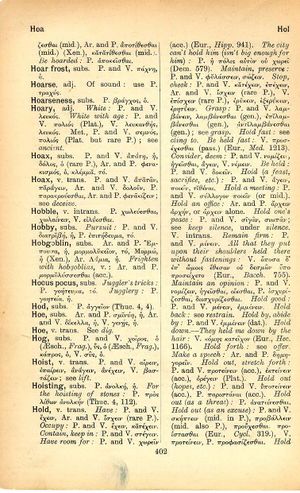hold
English > Greek (Woodhouse)
v. trans.
Have: P. and V. ἔχειν, Ar. and V. ἴσχειν (rare P.). Occupy: P. and V. ἔχειν, κατέχειν. Contain, keep in: P. and V. στέγειν. Have room for: P. and V. χωρεῖν (acc.) (Eur., Hipp. 941). The city can't hold him (isn't big enough for him): P. ἡ πόλις αὐτὸν οὐ χωρεῖ (Dem. 579). Maintain, preserve: P. and V. φυλάσσειν, σώζειν. Stop, check: P. and V. κατέχειν, ἐπέχειν, Ar. and V. ἴσχειν (rare P.), V. ἐπίσχειν (rare P.), ἐρύκειν, ἐξερύκειν, ἐρητύειν. Grasp: P. and V. λαμβάνειν, λαμβάνεσθαι (gen.), ἐπιλαμβάνεσθαι (gen.), ἀντιλαμβάνεσθαι (gen.); see grasp. Hold fast: see cling to. Be held fast: V. προσέχεσθαι (pass.) (Eur., Med. 1213). Consider, deem: P. and V. νομίζειν, ἡγεῖσθαι, ἄγειν, V. νέμειν. Be held: P. and V. δοκεῖν. Hold (a feast, sacrifice, etc.): P. and V. ἄγειν, ποιεῖν, τιθέναι. Hold a meeting: P. and V. σύλλογον ποιεῖν (or mid.). Hold an office: Ar. and P. ἄρχειν ἀρχήν, or ἄρχειν alone. Hold one's peace: P. and V. σιγᾶν, σιωπᾶν; see keep silence, under silence. V. intrans. Remain firm: P. and V. μένειν. All that they put upon their shoulders held there without fastenings: V. ὅποσα δʼ ἐπʼ ὤμοις ἔθεσαν οὐ δεσμῶν ὕπο προσείχετο (Eur., Bacch. 755). Maintain an opinion: P. and V. νομίζειν, ἡγεῖσθαι, οἴεσθαι, P. ἰσχυρίζεσθαι, διισχυρίζεσθαι. Hold good: P. and V. μένειν, ἐμμένειν. Hold back: see restrain. Hold by, abide by: P. and V. ἐμμένειν (dat.). Hold down. — They held me down by the hair: V. κόμης κατεῖχον (Eur., Hec. 1166). Hold forth: see offer. Make a speech: Ar. and P. δημηγορεῖν. Hold out, stretch forth: P. and V. προτείνειν (acc.), ἐκτείνειν (acc.), ὀρέγειν (Plat.). Hold out (hopes, etc.): P. and V. ὑποτείνειν (acc.), P. παριστάναι (acc.). Hold out (as a threat): P. ἀνατείνεσθαι. Hold out (as an excuse): P. and V. σκήπτειν (mid. in P.), προβάλλειν (mid. also P.), προὔχεσθαι, προΐστασθαι (Eur., Cycl. 319.), V. προτείνειν, P. προφασίζεσθαι. Hold out, not to yield: P. and V. ἀντέχειν, καρτερεῖν, ὑφίστασθαι. Last: P. and V. ἀντέχειν, Ar. and P. ἀνταρκεῖν, P. διαρκεῖν. Hold out against: P. and V. ἀντέχειν (dat.), ὑφίστασθαι (acc.), V. καρτερεῖν (acc.). Hold over: Ar. ὑπερέχειν (τί τινος). As threat: P. ἀνατείνεσθαί (τί τινι). Hold together, v. trans.: P. and V. συνέχειν; v. intrans.: P. συμμένειν. For a little while the alliance held together: P. ὀλίγον μὲν χρόνον συνέμεινεν ἡ ὁμαιχμία (Thuc. 1, 18) Hold up: P. and V. ἀνέχειν, Ar. and P. ἀνατείνειν (Xen.); see lift. Hold up (as example): P. παράδειγμα ποιεῖσθαι (acc.). interj. Stop: P. and V. ἐπίσχες, παῦε, Ar. and P. ἔχε, V. ἴσχε, σχές, παῦσαι (all 2nd pers. sing. of the imperative). subs. Thing to hold by: P. ἀντιλαβή, ἡ. Get a hold or grip: P. ἀντιλαβὴν ἔχειν. Support: P. and V. ἔρεισμα, τό (Plat.). Met., handle: ἀντιλαβή, ἡ, P. and V. λαβή, ἡ; see handle, influence. Custody: P. and V. φυλακή, ἡ. Lay hold of: P. and V. λαμβάνεσθαι (gen.), ἐπιλαμβάνεσθαι (gen.), ἀντιλαμβάνεσθαι (gen.); see grasp. Hold (of a ship): Ar. and V. ἀντλία, ἡ, P. ναῦς κοίλη (Dem. 883).

